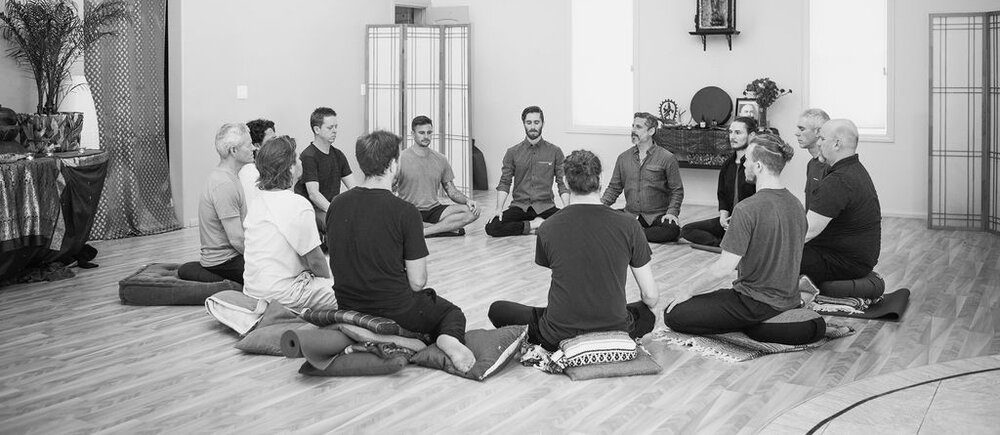Brother, I’m sure you’re no Don Draper, but chances are, you’re not as enlightened a communicator as you think you are.
A lot of men have decent or even great communication skills when the conditions to the conversation are favorable – meaning there’s no emotionality or triggers coming up.
For example, your partner listens attentively with gushing adoration as you talk about something inspiring to you. You open up and communicate honestly from the heart. Great.
Or, you are the one holding solid space and listening attentively when your partner shares something profound or vulnerable with you (without any charged emotion toward you, about a topic that doesn’t trigger you). Fantastic.
I’m not trying to burst your bubble here, but these aren’t heroic accomplishments.
I’ve had some pretty rude awakenings myself – there have been times that I’ve let all the work I’ve done over the years go to my head, and hold the idea that I’m a stellar rock star communicator, and then I get intense feedback from my woman and realize – oh damn! I still have my work to do.
The number one complaint about men from their feminine partners is a lack of real, deeply present listening.
Being a good communicator under favorable or neutral circumstances is just meeting the baseline. Sure, it requires consideration and basic social and emotional awareness, but it’s nothing extraordinary.
Most men’s communication style is more masculine and linear, with a focus on achieving an objective like getting more sex, doing your communication, maintaining your nice-guy status, or just getting to the end of the conversation.
And even though you have the best of intentions, often when you think you’re being a considerate communicator, underneath, you’re still unconsciously trying to achieve some goal – which does not include true, deep listening.
Most women (or feminine beings) have a keen sense for feeling through your well-presented, seemingly sensitive communication techniques. Even though you may be holding the right posture, and saying the right things, they can feel the energy behind your words.
It’s only when you are practicing being present, empty and open, that you invite real openness and intimacy from your partner.
You don’t earn stripes for being an excellent communicator (or even above-average) until you can stay present and in your heart when there’s emotionality involved.
Particularly when your partner’s strong emotions are directed at YOU.
Deep and present listening is quality women are talking about when they say “he is a good communicator” – or, in reverse, “when he is a shitty communicator.”
Communication is a two-way dance.
The art of speaking your heart, instead of just speaking your mind, is a crucial part of deep intimacy. Listening isn’t your only job – expressing your heart is essential too.
You don’t learn how to do this, though, until you learn to listen first.
Deep Listening
The art of deep listening isn’t just about listening to your partner; it’s also about creating a quiet space inside of yourself, a space that’s empty enough to receive the communication from your partner. It’s about being present and conscious of yourself while actively listening.
How can you speak your heart if you aren’t quiet and present enough to listen deeply to what’s being communicated to you?
This is why deep listening is the first foundational practice for healthy conscious communication and true intimacy.
How often have you become shut down when your partner tried to communicate something with you that had some emotion or upset behind it?
Emotionality is the expression of the feminine, and to expect a feminine being not to show emotion is a sign you have work to do.
Your partner feels emotion – You go into resistance to their emotion – You stop really listening – They feel your emotional absence – The communication breaks down.
The first significant work that needs to happen on the spot when you feel that resistance is to practice keeping your heart open and available, but of course, that’s not always possible.
Ok Men, solution time!!!
Here is a simple, focused, profound practice to use when you feel your heart shut down when relating with your woman or feminine partner.
For men, having a structured practice can be extremely helpful when faced with the intensity of the feminine.
There are a ton of communication techniques to improve communication with your intimate partner, but this one, Deep Listening, is at the top of the list.
Deep listening is a seriously kick-ass tool to support you in maintaining a heart connection with others, especially in times of high emotion.
Your partner will notice the difference immediately while interacting with you (although they may not be able to put words on it).
How do you do Deep Listening?
The first thing in deep listening is to drop your agenda for what you want to achieve during the interaction.
Focus on receiving and taking in what the other person is sharing more than trying to get your opinion across. Even if you’re a people-pleaser and you usually keep quiet and listen, this is still an excellent practice for you.
- Breath – Breath is vital in deep listening as it helps you get very present in the moment. Breathe slowly and deeply using your entire abdomen and chest capacity.
- Posture – Correct your body posture. Make sure that your back, shoulders, neck, and head are strong and upright.
- Take It In – Make your whole body a super-sensitive listening device; listen with your eyes, ears, nose, chest, belly, groin, hands, and feet.
- Heart – Widen your heart. Try to focus your listening in the center of your chest. You can play with visualizing a sun shining from the center of your chest, your side, and your back body.
- Alert Concentration – Heighten your awareness & alertness, as if you were in the mountains, and you heard a sound in the bushes. This will give you a sense of wakefulness that can cut through the resistance.
- Relax – Lastly, as best you can, relax. This is not just another place to be uptight and hyper-critical. This is about connection, trust, and openness.
So, try this out next time a challenge arises, or emotional intensity comes up in your relationship. This practice is about shifting your habitual patterns of closure to feminine emotion and moving into the fiery training ground of bare-bones listening, allowing the other to feel, and not trying to fix anything or make one wrong or right. It is simple, but not for the faint of heart!







